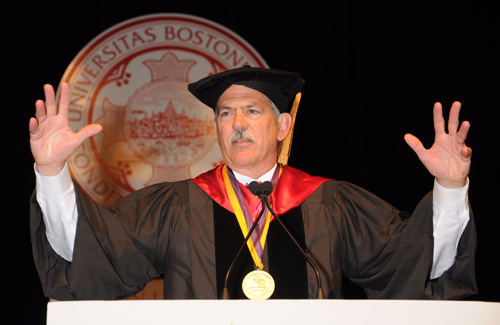Graduates Urged to Reposition Public Health as a 'Big Voice' in Health Care

They will be called many things as they head out into the world with their public health degrees — dreamers, do-gooders, idealists. But as they received their diplomas Saturday night, the BU School of Public Health Class of 2012 was called upon to show some muscle.
“You’re the Rodney Dangerfield of all professions. You don’t get no respect,” commencement speaker Paul Grogan, president and CEO of the Boston Foundation, told the 215 assembled graduates.
As the nation confronts a crisis of rising health care costs, “public health must re-brand and reposition itself in the public sphere, and it must have a voice — a big voice,” he urged. “This is your moment.”
Grogan took a new tack in a new venue, telling the graduates — gathered in BU’s Agganis Arena for the first time for commencement ceremonies– that while graduation speakers traditionally were expected to dispense advice, he had come to ask for help.
His plea: That the Class of 2012 “change the paradigm” in health care by making disease prevention as important as disease care.
“The U.S. is bankrupting itself on health care costs. . . and getting terrible results in the bargain,” Grogan said, noting the nation’s staggering obesity rates, among other health problems. “If we continue our current path of being willing to spend infinitely on medicine, but virtually nothing on prevention, the obesity epidemic alone will crush us.”
He said health care costs already were “wrecking” state and municipal budgets, forcing governments to slash spending on higher education and other services, and “crowding out other necessary investments.” Most troubling, he said, was that all the billions spent on medical care were producing “comparatively poor” health outcomes.
He encouraged the graduates to boldly argue for the efficacy of public health as “a critical component” of a national solution to spiraling health care costs.
“The disease-care paradigm has had its day, and it has been found terribly wanting,” Grogan said. “Yet medicine still has the power, the prestige and most of the resources.
“The visionaries of medicine and public health (must) come together to fashion a compelling hybrid strategy that would put the best of both worlds forward,” he said. “That is the urgent work that lies before us, and I urge you to take it up.”
Grogan’s call to action was coupled with a pledge of action by student speaker Austen Musso, who urged his classmates to think about why they had chosen the public health field, and to find a sense of mission that would compel them to “create and inspire change.”
Musso told a personal story about the death of a young boy he knew, at a hospital in Kenya — which he said underlined, for him, the tragic inequities in access to basic care.
“If I had to pick just one reason why I entered public health, I would say it’s because I don’t believe that your health or your happiness in life should be dependent on your race, religion, gender — or where you’re born,” he said.
In encouraging his fellow graduates to make a mark in their fields, Musso, who majored in international health, shared a favorite saying of William Bicknell, founding chairman and professor of international health:
“If you ever think you’re too small to make a difference, try sleeping in a closed room with a mosquito.”
BUSPH Dean Robert Meenan told the graduates that he had “never been prouder” of the school or its students in his nearly 20 years at its helm, despite continuing challenges such as rising tuition costs and uncertain economic times.
He said the school’s strong commitments to teaching, applied research, career placement and community involvement would carry it forward, and that financial assistance to students would continue to grow next year.
The BUSPH Class of 2012 includes 357 graduates: 180 students who graduated this month, 117 who graduated in January, and 60 who graduated last September.
Two faculty members and a number of students were recognized with awards. Victoria Parker, associate professor of health policy and management, was honored with the Norman A. Scotch Award for Excellence in Teaching, while David Ozonoff, founding chair and professor of environmental health, received the Faculty Career Award in Research and Scholarship.
Student Stephen Nicholson received the Leonard H. Glantz Award for Academic Excellence.
Other student awardees included:
- Dean’s Award for Student Research — Rebecca Laws
- Award for Student Excellence in Public Health Practice — Dominique Chambless; Priyanka Khandhar; Emily Winter-Wadsworth
- Rex Fendall Award for Excellence in Public Health Writing — Christine Baugh; Nollascus Ganda
- Katherine M. Skinner Memorial Prize for Commitment to the Study of Women’s Health Issues — Meredith D’Amore
- Herb Kayne Prize for Excellence in Biostatistics — Meghan Perkins
- The Dr. William B. Patterson Memorial Prize for Excellence in Environmental and Occupational Health — Tiffany Skogstrom
- The Dr. Theodore Colton Prize for Excellence in Epidemiology — Meredith Black
- Allan R. Meyers Memorial Prize for Excellence in Health Services — Desiree Otenti; Lisa Schottenfeld
- The John Snow, Inc. Award in International Health — Ivan Busulwa; Danit Kaya.
Submitted by: Lisa Chedekel, chedekel@bu.edu